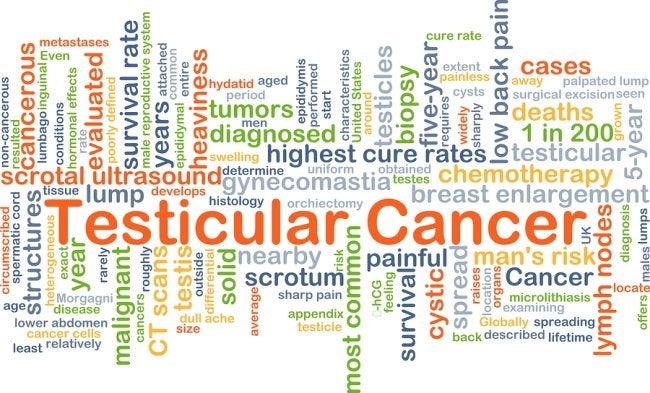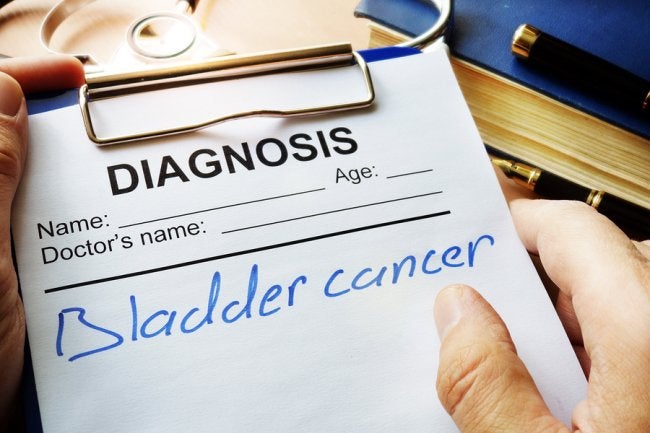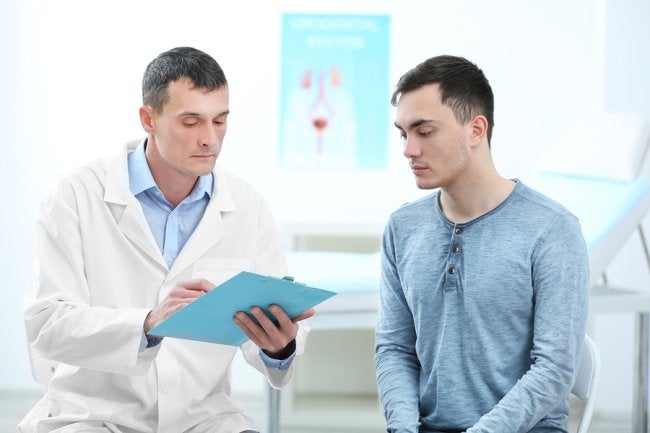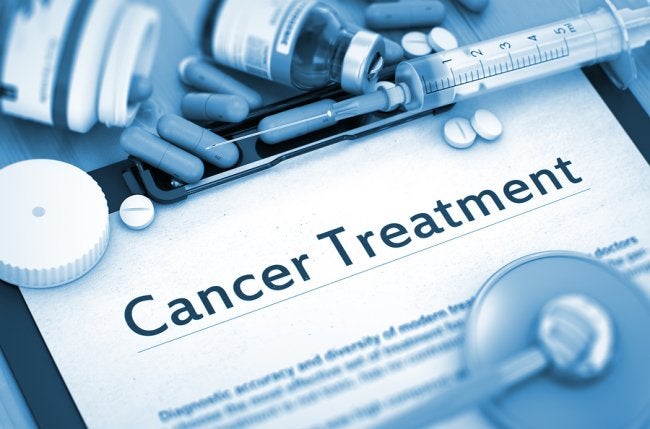-
Possible Culprits for Pain During Sex

Sexual health issues are a topic that many women are hesitant to discuss, even with their doctors. Know that sexual dysfunction is quite common among women, and receiving appropriate treatment is a necessary step toward improving quality of life. In some cases, problems such as painful sexual intercourse could indicate an underlying health problem, such as endometriosis. Women who take the first step by talking to a urology provider are being proactive patients.
Vaginal Atrophy
Vaginal atrophy typically occurs after menopause, when a woman has a drastically reduced amount of estrogen. This hormonal shift causes the vaginal walls to become thinner, less lubricated, and inflamed. In addition to painful sex, women with vaginal atrophy may experience urgent, painful urination, urinary incontinence, genital itching, and frequent urinary tract infections (UTIs).
Vaginismus
Vaginismus is the involuntary contraction or spasm of the vaginal muscles when penetration is attempted. It can occur when attempting sexual penetration or tampon insertion. In some cases, vaginismus is believed to stem from past sexual abuse.
Endometriosis
Normally, the tissue that lines the uterus is shed each month during a woman’s menstrual cycle. In women with endometriosis, uterine tissue grows outside the uterus. This displaced tissue also attempts to shed each month by growing thicker, breaking down, and bleeding. However, the tissue can’t be expelled. Displaced endometrial tissue can cause significant irritation and inflammation, along with the formation of scar tissue, adhesions, and cysts. Women with endometriosis commonly suffer from pain during or after sex, as well as intense pain during menstruation.
Uterine Fibroids
Uterine fibroids are abnormal growths attached to the uterine wall. These are not cancerous, but they can cause medical problems like pain during sex. Fibroids can range widely in size. Some women have just one, while others have many. In some cases, fibroids don’t cause symptoms. Large fibroids can cause painful sex, along with infertility, pelvic pain or pressure, and heavy, prolonged menstruation.
You’ll find sensitive, confidential care for sexual dysfunction in Tennessee at the Women’s Institute for Sexual Health (WISH). WISH, available at Urology Associates, P.C., takes a multidisciplinary approach to coordinate each patient’s care. Call us at (615)250-9265.
-
A Stage-by-Stage Look at Testicular Cancer Treatment Options

A testicular cancer diagnosis is devastating. Patients may regain a sense of control over their lives by studying their treatment options with the help of a urologist. Like many other cancers, testicular cancer is often treated with multiple types of medical interventions. Urologists carefully develop treatment recommendations based on the stage and specific type of testicular cancer, along with the patient’s overall health.
In Situ
In situ cancer, or stage 0 cancer, is diagnosed when the cancer is confined to the testicle and the patient doesn’t have elevated levels of tumor markers. In some cases, in situ testicular cancer is managed with close surveillance. It may only need treatment if it shows signs of growing or spreading. If in situ cancer is treated, the testicle is usually removed or treated with radiation therapy.
Stage I
Stage I treatments depend on whether the cancer is a seminoma or non-seminoma. Stage I seminomas are treated surgically by removing the spermatic cord and testicle , followed by active surveillance, or either chemotherapy or radiation therapy. The treatment for stage I non-seminomas typically involves the surgical removal of the testicle, followed by one or more of these options:
- Active surveillance
- Removal of the lymph nodes at the back of the abdomen
- Chemotherapy
Stage II
If the patient has a stage IIA seminoma, he will likely have surgery to remove the testicle, followed by radiation treatment directed at the retroperitoneal lymph nodes. Otherwise, the urologist will likely recommend three or four cycles of combination chemotherapy. After the surgical removal of the testicle for patients with stage II non-seminomas, the level of tumor markers will determine the subsequent treatment. It may be chemotherapy, or the removal of lymph nodes, which may possibly be followed with chemotherapy.
Stage III
Although stage III testicular tumors have spread beyond the testicles, they are still highly treatable. Patients can expect the surgical removal of the testicle, followed by aggressive chemotherapy. It’s possible for cancer at this stage to spread to the brain, in which case the preferred treatment is usually radiation therapy. Surgery might also be an option.
Men with testicular cancer in Tennessee need answers and treatment options they feel confident about. That’s why so many patients have turned to Urology Associates, P.C. for cutting-edge care delivered by compassionate, understanding healthcare providers. New and current patients can reach us at (855) 901-1338.
-
Cystectomies: What to Know and What to Do

Bladder cancer is one of the less common types of cancer diagnosed in the U.S. It usually affects older adults, and it’s typically diagnosed in its earlier stages. Although cancer treatment is more effective when administered as early as possible, this particular disease does have a higher risk of recurrence than most cancers. If the cancer comes back after an initial treatment, or if it isn’t diagnosed until it’s started to spread, then the urologist may recommend a cystectomy.
About the Surgery
The doctor may perform a partial cystectomy, which removes only part of the bladder , or a radical cystectomy, which removes the entire bladder. In men, this latter option also involves the removal of the prostate and seminal vesicles. In women, the removal of the uterus, cervix, ovaries, fallopian tubes, and some of the vaginal may also need to be removed. If you’ll be undergoing a radical cystectomy, your doctor will explain your options for reconstructive surgery. It will be necessary to have an alternative way of storing urine. There are three options:
- Incontinent diversion: A stoma bag, located outside the body, collects urine for manual emptying.
- Continent diversion: No bag is located on the outside of the body. Urine is drained by inserting a catheter into the new valve on the front of the abdomen.
- Neobladder: The newest method of diverting urine, this involves recreating a new bladder from intestine. Patients may still suffer incontinence, but they can urinate normally.
Steps to Prepare
You’ll be given specific instructions to prepare for the cystectomy, based on your unique health factors. You may be asked to:
- Quit smoking
- Avoid alcohol
- Limit or avoid caffeine
- Make changes to your prescribed and over-the-counter medications
You’ll be placed under general anesthesia for this surgery. To ensure your safety, you’ll need to avoid liquids and food after a certain point—usually midnight the night before the surgery. You should also make arrangements for your recovery. A cystectomy is major surgery, and you can expect to be in the hospital for about five to six days.
At Urology Associates, P.C., you’ll find compassionate care and cutting-edge cancer treatments right here in Tennessee. Our urology team emphasizes the importance of patient education, so you’ll know exactly what to expect and how to prepare for your treatment. Contact our office at (855) 901-1338.
-
Bone Health Care at Our Men’s Health Clinic
The Men’s Health Clinic at Urology Associates, P.C., in Nashville offers a continuum of care to help men live life to the fullest. Watch this video to hear one of our dedicated providers talk about our bone health services. He explains that, although most patients with osteoporosis are female, many men are also affected by this serious problem—especially those who have received cancer treatment for prostate cancer.
It’s possible to have osteoporosis or osteopenia without realizing it. When you arrive at our Men’s Health Clinic, you can learn about any risk factors you may have. These might include a history of smoking, moderate to heavy alcohol use, and certain medical conditions. Urology Associates, P.C., offers rapid diagnostic services and comprehensive treatment of osteoporosis.
You can meet with a urologist in Tennessee by calling Urology Associates, P.C. at (855) 901-1338. In addition to providing effective men’s bone health treatment , our expert team offers cancer treatment and male infertility treatment.
-
Don’t Let These Myths Scare You Away from a Clinical Trial

Cancer treatment has come a long way in recent decades. It’s more effective than it used to be, but sometimes, certain cancers just don’t respond the way urologists would like. Some patients may be good candidates for clinical trials if they haven’t responded well to established medical interventions. If your doctor suggests that you consider a clinical trial, you should become fully informed before making a decision. The doctor can help you learn the truth behind the misconceptions about clinical trials.
Myth: Clinical trials are too risky and dangerous.
Every medical treatment has the potential for side effects and complications—whether you’re taking aspirin or undergoing surgery. Do talk to your doctor about the potential risks of the clinical trial you’re considering. However, remember that clinical trials are governed by a strict set of oversight requirements. They’re carefully designed, administered, and monitored so that they can be as safe as possible for the participants.
Myth: Cancer patients may be given faux drugs in clinical trials.
Clinical trials do use placebos, which are pills that do not contain an active ingredient. This is done for the purpose of evaluating the true effectiveness of the treatment. However, placebos aren’t generally used for patients with serious illnesses like cancer. Placebos are never used if their use would place a patient at risk. You may also be reassured to know that you can ask in advance if the clinical trial would involve a placebo.
Myth: If I join a clinical trial, I won’t be able to leave for other treatment.
You have the right to direct your own medical care. Even if you sign up for a clinical trial and begin receiving treatment, you can decide to drop out of the study at any time. The researchers may ask for your permission to continue monitoring you for possible long-term effects.
Urology Associates, P.C. is committed to giving our patients the advanced care they need to fight their diagnosis. Our Advanced Therapeutics Center administers clinical trials for cancer treatment in Tennessee, and many of the medical interventions used have already been FDA-approved. Call (855) 901-1338 to request a consult with our prostate cancer experts.
-
Is Surgery the Only Option for Peyronie’s Disease?

Surgery is still considered the most effective treatment for Peyronie’s disease, which is a condition in which the penis develops a curvature that may become painful. Urologists may recommend a nonsurgical treatment for certain patients. An injected biologic medicine is FDA-approved to treat Peyronie’s disease in men with curvature of at least 30 degrees during an erection. Candidates must also have an observable lump, which is caused by the accumulation of plaque within the penis.
The biologic medicine helps reduce the accumulation of plaque in order to treat the abnormal curvature. Men who receive this treatment can expect to return to the urologist’s office several times. At each appointment, they will receive penile injections. The doctor will perform penile modeling treatments to help stretch the plaque and straighten the penis.
Peyronie’s disease is one of the many sexual dysfunctions we treat here at Urology Associates, P.C. If you’ve been referred to a sexual health specialist in Tennessee, you can call us at (855) 901-1338.
-
Why Do I Have Bloody Urine?

Hematuria is the medical term for bloody urine . It’s always alarming to see blood in your urine, although the underlying cause might not necessarily be too serious. However, you should always see a doctor for an evaluation as you may require medical treatment. Your family physician can refer you to a urologist for medical testing and a comprehensive exam.
Urinary Tract Infection
Urinary tract infections (UTIs) can affect both men and women, although women are at a higher risk. Usually, the urethra or bladder is affected by this bacterial infection. Since the infection is caused by bacteria , a urologist may prescribe antibiotics. In addition to blood in the urine, a UTI can cause pelvic pain or pressure, persistent urges to urinate, and the frequent passing of small amounts of urine.
Kidney Infection
UTIs aren’t always limited to the urethra or bladder. If the bacteria infect the kidneys, the consequences can be serious. Unless you seek prompt medical care for a kidney infection, it’s possible to sustain permanent kidney damage or sepsis. A kidney infection can cause the same symptoms as a UTI, but it will also cause fever, chills, nausea, or vomiting. Pain can develop in the back, side, or abdomen.
Kidney or Bladder Stones
Urine contains minerals. Over time, these minerals can crystalize on the kidney or bladder walls. The crystals can then gradually form either kidney or bladder stones, which are hardened deposits. Patients often don’t experience symptoms like pain and bloody urine unless the stones start to shift around or cause a blockage. When this happens, the pain can be excruciating.
Cancer
There’s a possibility that blood in the urine can indicate cancer of the prostate, kidneys, or bladder. Symptoms of these cancers may not appear until the disease is already at an advanced stage. If the urologist has ruled out all other possibilities of bloody urine, he or she may request some tests to check for cancer.
When you’re experiencing troubling symptoms, you need to know that your health is in good hands. Come in and talk with the specialists at Urology Associates, P.C. You can schedule an appointment with a urologist in Tennessee by calling (855) 901-1338.
-
Prostate Cancer 101
Prostate cancer is one of the most common types. Fortunately, most men diagnosed with it have slow-growing tumors. There are several cancer treatments available. Your urologist will develop a personalized treatment plan, depending on the exact type of prostate cancer, and the man’s age and general health.
You can hear more about cancer treatment when you watch this interview with Dr. Charles Eckstein. He’s a urologist at Urology Associates, P.C. In this video, Dr. Eckstein covers the diagnostics, staging, and treatment planning processes. Some of these treatments include internal and external radiation therapy, and open or minimally invasive surgery.
Urology Associates, P.C. is committed to providing an exceptional level of care for men diagnosed with prostate cancer in Tennessee. You can call (855) 901-1338 to request a consult.
-
Clinical Trials for Cancer: A Patient’s Guide to Making the Decision

Cancer treatment for kidney, bladder, and prostate cancers can be effective when the disease is diagnosed in the early stages. As the cancer cells multiply and spread beyond the point of origin, eliminating the cancer becomes increasingly difficult. Sometimes, patients with advanced cancer have already gone through surgery, and multiple rounds of chemotherapy and radiation therapy, only to discover that they still have cancer and they are out of treatment options. As distressing as this is, there may be still be hope. A clinical trial gives patients another chance to become cancer-free.
Possible Benefits of Clinical Trials
A clinical trial tests emerging treatments that aren’t yet available to non-participants. Although there are no guarantees in medicine, it’s possible that this new treatment will help patients live longer . Even if the treatment doesn’t work, some patients take heart in the fact that they’ve contributed to cancer research, and that others may benefit from their contribution.
Potential Risks of Clinical Trials
The main risk with a clinical trial is that it won’t help. It’s also possible for the emerging cancer treatment to cause mild to severe side effects that may reduce quality of life. Patients will likely need more visits to the urologist’s office, and these will subtract from the patients’ remaining time with his or her family.
Common Eligibility Criteria for Clinical Trials
Not everyone is eligible to join a clinical trial. The right set of circumstances has to exist. First, there must be a clinical trial available that involves a potential treatment for that particular type of cancer. That trial must still be accepting new study participants. Next, the patient must meet the specific eligibility criteria for that clinical trial. Some of the most common criteria are:
- Being within a certain age range
- Being diagnosed with a specific type and stage of cancer
- Having a certain medical history
- Demonstrating a specific health status
At Urology Associates, P.C., our Advanced Therapeutics Center is committed to saving lives with cutting-edge therapies, including those offered in clinical trials. Here, you’ll receive in-depth, personalized guidance on the cancer treatments available in Tennessee. Call (855) 901-1338 for an appointment to discuss whether a clinical trial may be the right choice for you.
-
Our Advanced Therapeutics Center: What to Expect

Focused on delivering high-quality care using the latest therapies and technology, our Advanced Therapeutic Center at Urology Associates, P.C. offers treatment that compliments the medicine provided by your care team for various conditions. Here, we work as a specialized unit of care providers and physicians to administer newer and more complex treatments to our patients.
In some cases, when the disease progresses despite standard cancer treatment, the team at our Advanced Therapeutics Center can offer clinical trials as an option for eligible patients. Besides cancer therapies for advanced disease, we manage and monitor the side effects that can be brought on by agents used in clinical trials to help minimize their impact on put patients’ quality of life. Finally, we offer mobile specialty clinics that focus on bone health and men’s health.
Would you like to discover more about our Advanced Therapeutics Center services or options for prostate and testicular cancer treatment in Nashville ? If so, then please contact Urology Associates, P.C. by calling (855) 901-1338.
Recent Posts
categories
- Uncategorized
- Bladder Cancer
- Women's Sexual Health
- MonaLisa Touch
- Urology
- Urologist
- Erectile Dysfunction
- Kidney Cancer
- Incontinence
- Prostate
- MonaLisa Touch Laser Treatment
- Kidney Stones
- Urinary Tract Infections
- Event
- Sexual Dysfunction
- Testicular Cancer
- Prostate Cancer
- Urology Surgery Center
- urinary incontinence
- vaginismus
- noncoital pain disorder
- Hypoactive Sexual Desire Disorder
- Infographic
- provenge
- Xofigo
- robotic surgery
- hormone replacement
- diabetes
- renal cell carcinoma
- pelvic pain
- hematuria
- sexual health
- chronic testicular pain
- premature ejaculation
- Men's Health Clinic
- Dr. Melvin Seard
- Interstitial Cystitis
- vasectomy
- overactive bladder
- vaginal atrophy
- nocturia
- bladder infections
- urethral strictures
- Acute Epididymitis
- low sex drive
- circumcision
- pelvic floor dysfunction
- Peyronie's Disease
- prostatitis
- female sexual dysfunction
- varicocele
- difficult urination
- low libido
- PSA levels
- male fertility
- penile prosthesis
- prostatic intraepithelial neoplasia
- male infertility
- estrogen levels
- nurse navigator
- stress urinary incontinence
- vaginal yeast infection
- elevated psa
- painful sex
- adult circumcision
- epididymitis
- OAB
- kidney infection
- penile cancer
- pelvic organ prolapse
- Vasectomy Reversal
- bone health
- cystectomies
- clinical trials
- bloody urine
- Advanced Therapeutic Center
- WISH MedSpa
- neurogenic bladder
- WISH Team
- prostate biopsies
- BPH
- fecal incontinence
- lithotripsy
- osteoporosis
- kidney cysts
